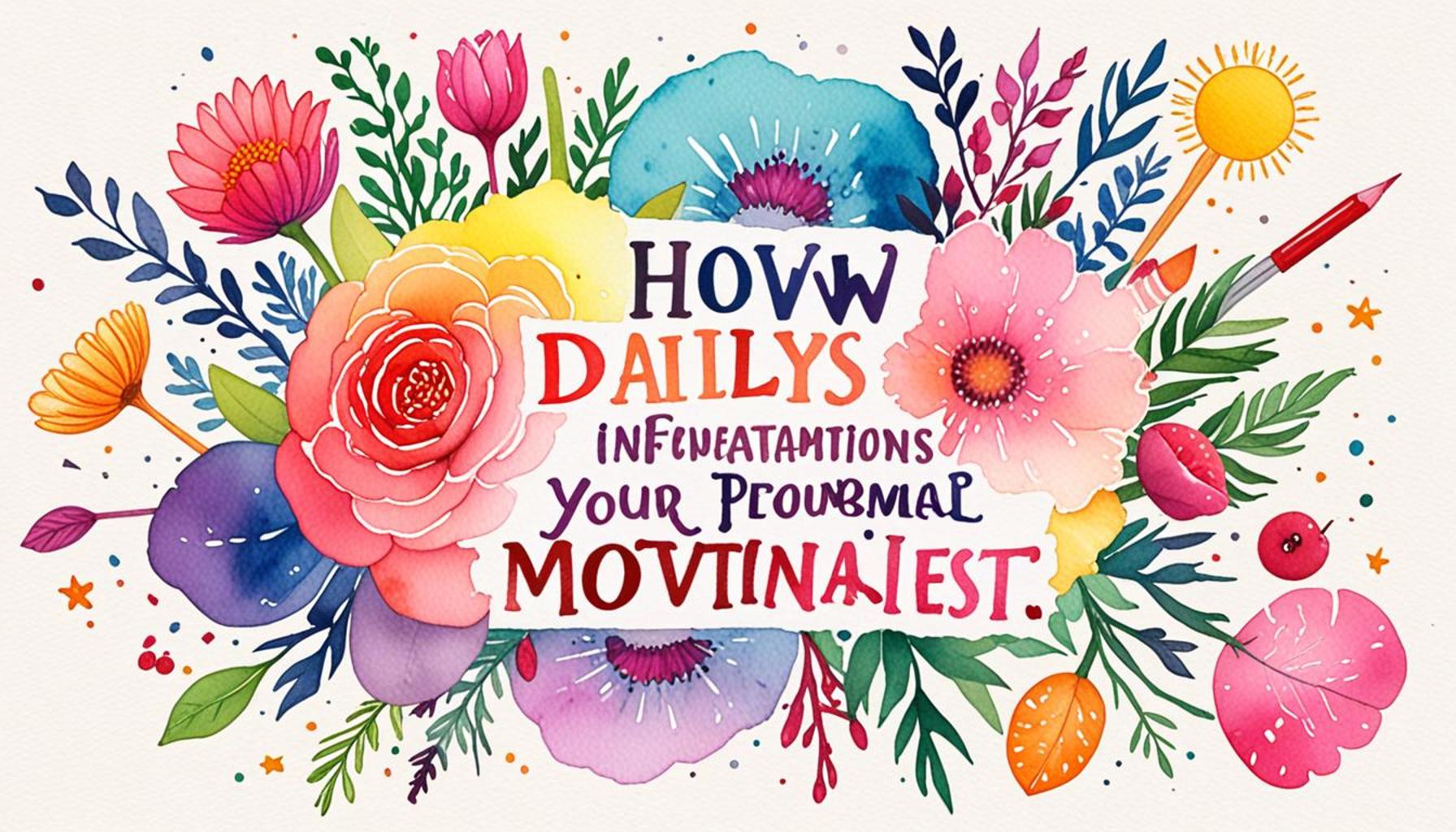How to Use Positive Affirmations to Improve Personal and Professional Relationships

Understanding the Power of Positive Affirmations
In a world that often feels overwhelming, finding ways to forge and nurture personal and professional connections has become essential for growth. One towering approach to enhance these connections is through the practice of positive affirmations. These seemingly simple statements are not merely sentimental fluff; they hold the potential to dramatically alter our self-perception and, consequently, the nature of our relationships with others.
The Role of Positive Affirmations
Positive affirmations operate as daily reminders that reinforce our self-worth and capabilities. They are powerful tools in reshaping thoughts and behaviors. Here are several key reasons why these affirmations are fundamental:
- Building Confidence: For individuals who struggle with self-doubt, such as many in Nigeria’s competitive work environment, positive affirmations can serve as a profound confidence booster. For instance, an employee preparing for a crucial presentation might say to themselves, “I am knowledgeable and prepared” to instill a sense of readiness and capability.
- Attracting Supportive Relationships: Adopting a positive mindset can make us more approachable. When we change the narrative in our heads from “I am not enough” to “I am deserving of love and respect,” we project warmth and openness, attracting connections that are both meaningful and uplifting.
- Reducing Stress and Anxiety: In high-pressure situations, such as tight deadlines or family responsibilities, affirmations like “I can handle whatever comes my way” can alleviate anxiety and create a calm demeanor, making one more inviting to others.
A Local Perspective on Affirmations
This practice resonates strongly in the Nigerian context, where communal ties are deeply ingrained. Affirmations can enhance connections with colleagues, strengthen familial bonds, and foster a constructive work environment. For example, expressing gratitude and acknowledging each other’s contributions can build a culture of respect and collaboration in an office setting.
Incorporating Affirmations into Daily Life
Implementing affirmations into daily routines is straightforward and can yield significant benefits. Here are a few effective methods:
- Daily Reflections: Take a few moments each morning to reflect on personal strengths, such as resilience or creativity. This sets a positive tone for the day ahead.
- Sharing Affirmations: Consider sharing affirmations with friends or family members. A community that uplifts one another can bolster mental health and create a positive feedback loop.
- Preparation for Challenges: Those preparing for work-related presentations or family gatherings could utilize affirmations to manage nerves, boosting not just their confidence but also their effectiveness in engaging others.
Conclusion
As we continue to explore the efficacy of positive affirmations, we will delve into practical steps to implement this transformative practice effectively. By honing in on its impact on interpersonal relationships, especially within the Nigerian cultural context, we will provide interactive examples that not only resonate but also illuminate the profound potential of these uplifting statements.
ADDITIONAL INSIGHTS: Expand your understanding here
Transforming Mindset Through Affirmations
The journey toward improving personal and professional relationships begins with a key realization: our thoughts significantly shape our reality. Positive affirmations harness the power of self-talk, enabling individuals to frame their interactions and perceptions in a more constructive and affirmative light. By embracing positivity, we can adjust our mental framework and foster the kind of relationships that thrive on mutual respect and understanding.
In Nigeria—a nation characterized by its rich tapestry of cultures and communal ties—the use of positive affirmations can be particularly poignant. The cultural emphasis on community-oriented values means that how we communicate, both with ourselves and others, can profoundly impact the dynamics of our interactions. Affirmations are not only a means of personal growth but also a bridge to deeper connections with family, friends, colleagues, and broader social circles.
Practical Strategies for Using Affirmations
To effectively incorporate positive affirmations into daily life, it’s essential to adopt a clear strategy. Here are several practical methods to ensure these affirmations resonate deeply:
- Crafting Specific Statements: Generic affirmations may lack impact. Focus on specifics that address personal and professional goals. For instance, instead of saying “I am successful,” try “I successfully communicate my ideas during team meetings.”
- Visual Reminders: Writing affirmations down or creating visual reminders—such as post-it notes placed on your desk or bathroom mirror—can prompt daily engagement with these positive messages. In a bustling city like Lagos, these cues can serve as valuable grounding tools amidst daily distractions.
- Incorporate Cultural Context: Integrate local proverbs or sayings that reinforce the spirit of affirmation. For example, incorporating phrases like “Unity is strength” can highlight communal ties while embracing the affirmational ethos.
- Practice Affirmations Aloud: Speaking affirmations aloud can enhance their potency. Engaging in dialogue with yourself fosters a stronger sense of belief. This practice is further enriched in communal settings, where sharing affirmations can inspire others.
By integrating these practical strategies into your routine, you begin to create a mindset that is conducive to forming and maintaining quality relationships. Each affirmation becomes a stepping stone towards a more open and confident self, inviting others to respond positively and connect on a deeper level.
The Ripple Effect of Positive Relationships
Embracing positive affirmations not only uplifts the individual but can spark a ripple effect in personal and professional settings. In fostering self-acceptance and nurturing confidence, individuals who practice affirmations may find themselves more willing to express appreciation towards colleagues or family members. This openness enhances interactions, often resulting in stronger teamwork and a supportive home environment.
The impact of these affirmations is profound; they create a foundation of positivity that enhances collaboration and understanding. When individuals acknowledge and celebrate their strengths, they pave the way for reciprocal acknowledgment from others, enriching the quality of all relationships.
| Category | Key Features |
|---|---|
| Self-Confidence | Positive affirmations reinforce personal value, enhancing self-esteem and self-worth. |
| Conflict Resolution | Empowering affirmations can pave the way for effective communication, leading to smoother negotiations and resolutions in tense situations. |
| Enhanced Empathy | Affirmations that focus on understanding others’ perspectives promote compassion, deepening interpersonal connections. |
| Professional Growth | Utilizing affirmations inspires motivation and ambition, leading to personal advancement within one’s career. |
To delve deeper, the notion of professional growth through positive affirmations is particularly compelling. Research suggests that when individuals actively engage in affirmations that align with their career goals, they may experience heightened productivity and creativity. Furthermore, the psychological reinforcement of their capabilities can result in greater resilience to workplace challenges.In the personal sphere, practicing affirmations that focus on appreciation and attention towards friends and family can significantly transform interpersonal dynamics. For instance, regularly affirming one’s commitment to listening attentively can cultivate stronger bonds and enhance trust within relationships.Equipped with the right mindset through positive affirmations, individuals not only improve their relationships but also contribute to creating a supportive environment that nurtures both personal and professional excellence. Consider incorporating these affirmations into daily routines, perhaps through journaling or meditation, to witness tangible improvements over time.
SEE ALSO: Click here to read another article
Building Empathy and Understanding Through Affirmations
The foundation of any lasting relationship—be it personal or professional—lies in the ability to connect with others on an emotional level. Positive affirmations can play a crucial role in enhancing empathy and promoting understanding among individuals. By regularly affirming our own value and the value of others, we promote a culture of support and recognition, which resonates deeply within Nigerian society’s inherently communal nature.
For instance, when family members or colleagues affirm each other’s capabilities, it fosters an environment where open communication thrives. Simple statements such as, “I appreciate the effort you put into your work,” or “Your perspective is valuable,” not only uplift the recipient but also fortify bonds between individuals, creating a foundation of trust that is essential in navigating both personal interactions and professional collaborations.
Creating a Positive Workplace Culture
In today’s fast-paced professional environment, encouraging the use of positive affirmations can transform workplace dynamics. Organizations that prioritize a culture of positivity often see boosted morale and enhanced productivity. By implementing programs that encourage team members to share affirmations, companies can harness a sense of belonging that encourages collaboration.
- Team Affirmation Sessions: Designate time during team meetings for members to express appreciation for one another’s contributions. This not only reinforces individual strengths but also nurtures a cohesive team spirit, much needed in workplaces across varying industries in Nigeria, from creative agencies in Lagos to tech startups in Abuja.
- Goal-Oriented Affirmations: Encourage staff to create affirmations that resonate with their professional aspirations. These could take the form of “I excel when managing projects” or “I build strong relationships with clients,” empowering employees by aligning their personal affirmations with the collective goals of the organization.
- Peer Recognition Programs: Establish programs that incentivize employees to recognize peers publicly, which can encourage a culture of appreciation and gratitude. When coworkers actively affirm each other, it fuels a cycle of positivity that benefits everyone involved.
The role of affirmations in creating a positive workplace extends beyond mere words. Research has shown that environments rich in positive feedback can lead to lower turnover rates and increased creativity among teams. In the context of Nigeria’s competitive job market, fostering such an environment can be instrumental in maintaining talent and achieving organizational success.
Harnessing Technology for Reinforcement
In an age where technology shapes our lives, positive affirmations can be easily integrated into digital routines. With the proliferation of smartphones and social media, affirmations can be tailored to fit any lifestyle. Mobile apps dedicated to personal growth often incorporate affirmation reminders, prompting users to engage with their positive statements throughout the day.
Moreover, platforms like WhatsApp or Instagram can serve as venues for sharing affirmations with friends and colleagues, reinforcing a network of support and positivity. An initiative such as a ‘daily affirmation’ challenge can create a ripple effect, as participants engage and uplift one another, further strengthening their interpersonal ties.
The power of positive affirmations reaches beyond the individual; they cultivate atmospheres where coping with challenges becomes easier, particularly in a diverse society like Nigeria, where varying perspectives enrich discussions but may also lead to misunderstandings. By focusing on affirmations that foster respect and kindness, relationships can thrive in harmony, paving the way for personal growth and collaborative success.
CHECK OUT: Click here to explore more
Conclusion
In summary, the utilization of positive affirmations serves as a powerful tool for enhancing both personal and professional relationships across Nigeria’s diverse cultural landscape. By fostering a sense of empathy and understanding, these affirmations cultivate an environment rich in appreciation and respect, allowing individuals to connect on deeper emotional levels. This nurturing of relationships is particularly essential in Nigerian society, where community ties play a significant role in everyday life.
Implementing affirmations in the workplace leads to more than just increased morale; it creates a positive culture that promotes creativity, collaboration, and loyalty among team members. Furthermore, by leveraging technology, such as mobile apps and social media platforms, individuals can seamlessly weave affirmations into their daily routines, amplifying the positive impact on their relationships.
As we navigate the complexities of our interactions—be it with family, friends, or colleagues—embracing a practice centered around positivity not only individuals blossom but also the communal fabric of our society strengthens. This holistic approach to relationships promises personal growth and professional success, illustrating that a few thoughtful words can indeed foster profound connections. Consequently, let us embark on this journey of affirmation, enriching our ties with both ourselves and those around us, thus paving the way for a brighter, more interconnected future.


